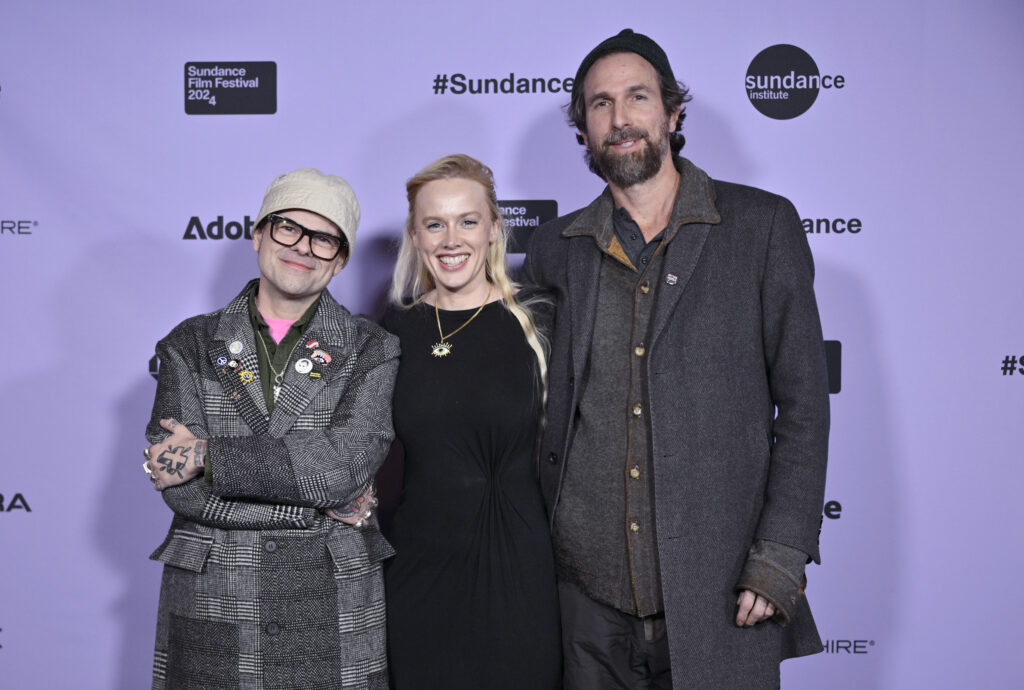Attending the premiere of “Better Angels: The Gospel According to Tammy Faye” on January 19 at the 2024 Sundance Film Festival were (from left) Jay Bakker, son of Tammy Faye and Jim Bakker; screenwriter Hellen Rollins, and writer-director Dana Adam Shapiro. (Photo by Stephen Greathouse/Shutterstock)
By Vanessa Zimmer
Shame on so many of us that, at the mention of the name Tammy Faye, we visualize a caricature of a woman with great daubs of tar-like mascara framing eyes that are often filled with tears.
Instead — as suggested in Better Angels: The Gospel According to Tammy Faye, which opened January 19 at the 2024 Sundance Film Festival in Park City, Utah — perhaps we ought to be thinking of an icon of the 1970s and ’80s who campaigned for Christian love and inclusion for all. At the height of the AIDS epidemic, when other religious leaders said gays were being punished for their sins and many in the general population were homophobic, Tammy Faye Bakker bravely advocated compassion. Her stance was immensely controversial for the times.
The first two episodes of Dana Adam Shapiro’s four-part documentary are screening in the Episodic section at the Festival. The documentary follows the rise and fall of Jim and Tammy Faye Bakker, who founded an evangelical enterprise that included The PTL Club television show and Heritage USA, a Christian community that included a theme park ranking behind only Disney World and Disneyland in numbers of visitors.
In a post-premiere Q&A, Shapiro compares those turbulent days of shunning gays, lesbians, and AIDS victims with the political divisiveness and hatred of our current times. He suggests it is time for all of us to listen to “the better angels of our nature” and be more accepting, loving, and kind, like Tammy Faye Bakker. The “better angels” phrase, coined in President Abraham Lincoln’s first inaugural address, became an apt part of the title of Shapiro’s film revealing Tammy Faye’s compassion.
“Being confronted with your own judgmentalism is a powerful thing,” Shapiro says. “I had sort of thought of her [Tammy Faye] in this cartoonish caricature way: the eyelashes, the camp, the crying. I had no idea she was this open-hearted secular saint in a way. The things that she was doing, the things that she was saying, were very radical and so outside the tabloid, tawdry thriller aspects of the story.
“It was like I was kind of a jerk, I had sort of seen her in this SNL way. I’m part of that judgmentalism, that knee-jerk [reaction]. I wasn’t listening to the better angels of my nature.”
The director traces Tammy Faye’s life, beginning with her childhood in a poor family in International Falls, Minnesota. The ebullient young girl loved to make people laugh. Even then, she rebelled against the austerity and strictness of Pentecostal beliefs.
She always wanted to look pretty, and when a girlfriend introduced her to eye makeup, she was thrilled. Her extreme makeup was a point of criticism at the height of her evangelical fame. “I don’t think God cares one bit if you put some lipstick and eye makeup on,” an adult Tammy Faye says in the film. To her way of thinking, why would He care if it makes you feel better about yourself?
The Bakker empire fell after Jim Bakker was convicted in a 1989 trial of mail and wire fraud and conspiracy to defraud the public.
Tammy Faye divorced him in 1992 while he was in prison, and a year later married property developer Roe Messner. She died in 2007 after a long cancer battle.

































